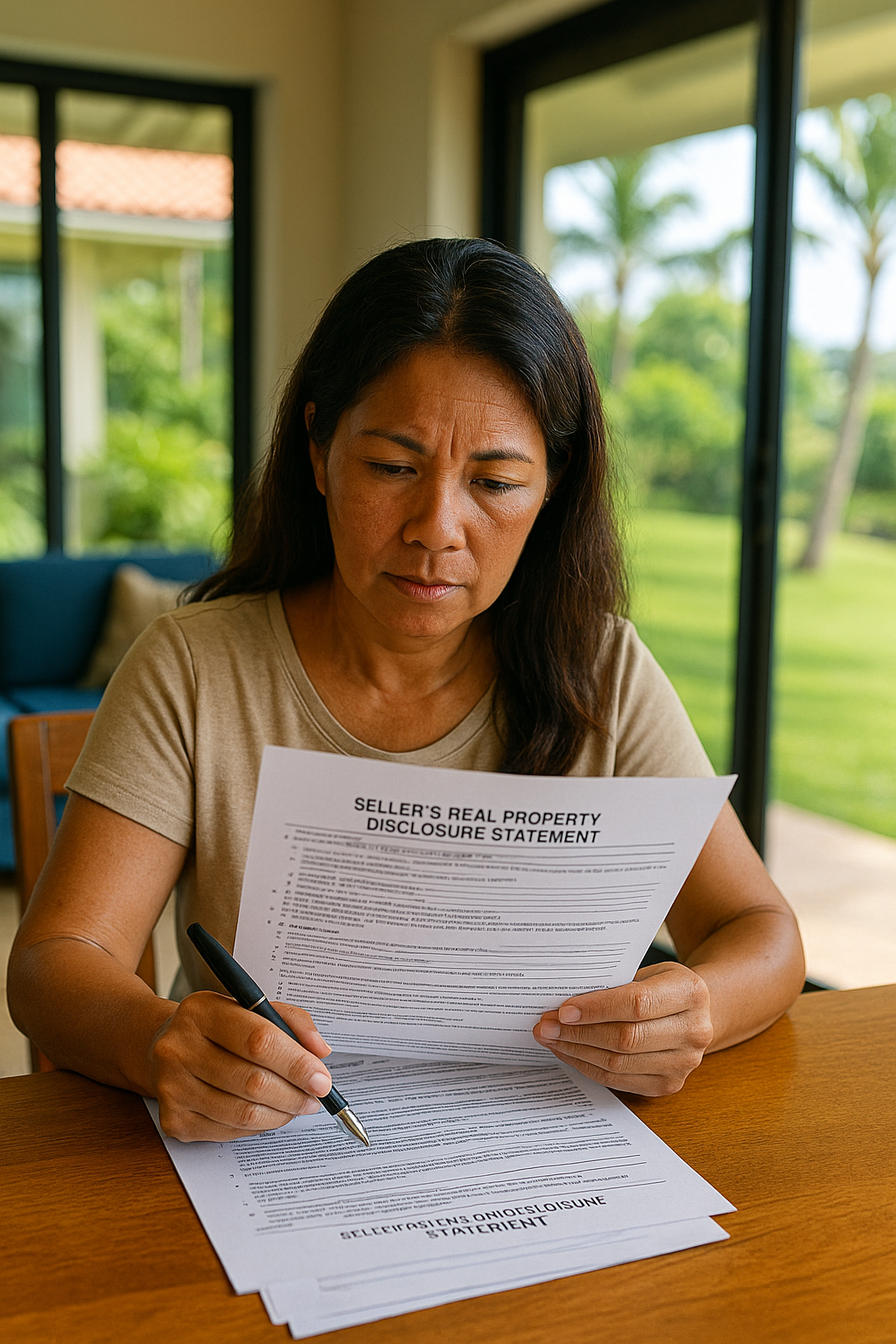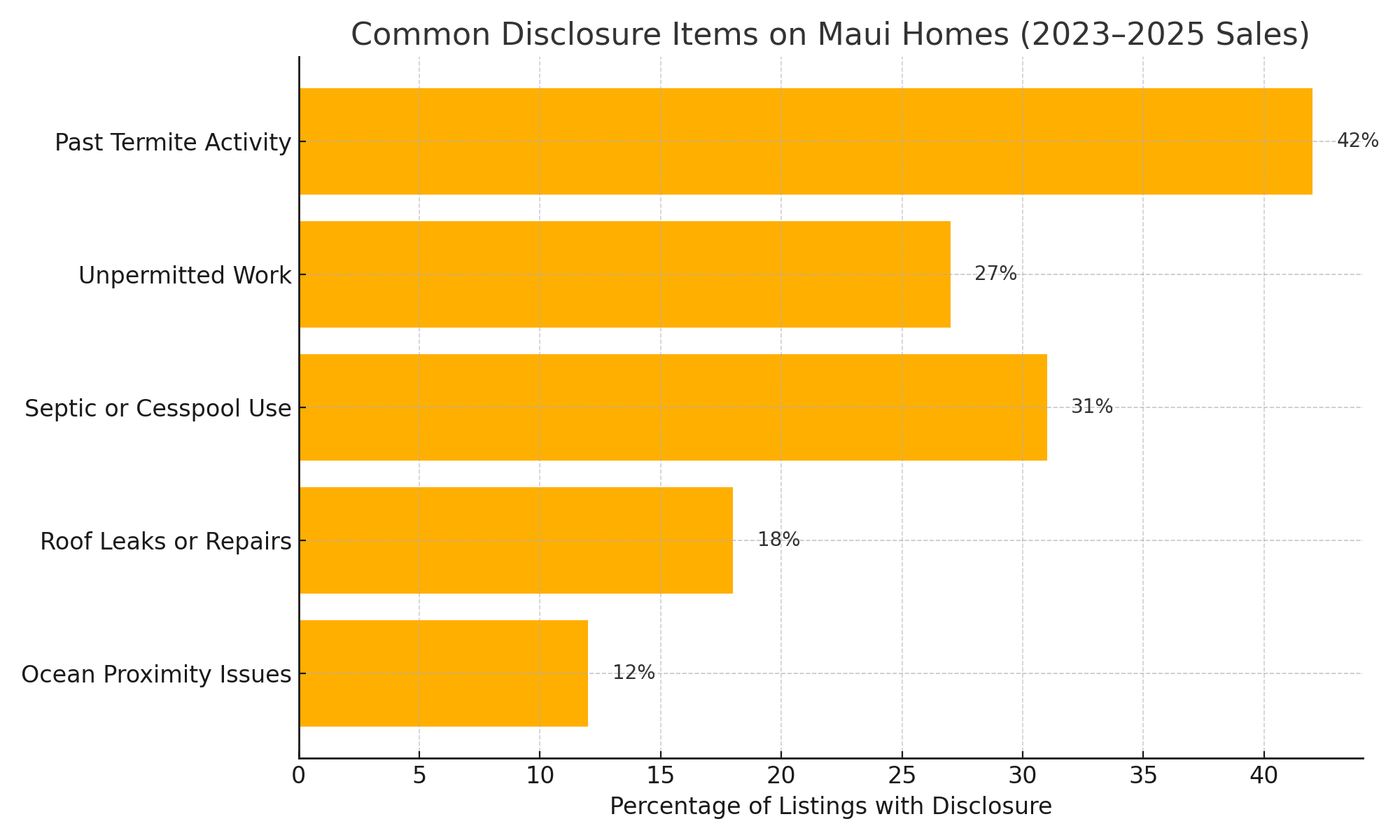Categories
Selling on MauiPublished July 29, 2025
Understanding Seller Disclosures in Hawaii—and Why They Matter When Selling Your Home

If you're planning to sell your home in Hawaii, there's one crucial piece of paperwork you can’t afford to ignore: the Seller’s Real Property Disclosure Statement (SRPDS). Whether you're listing a beachfront bungalow in Kihei or a hillside retreat in Kula, the seller disclosure is a legal requirement—and a key part of a smooth, transparent real estate transaction.
In this post, we’ll break down:
-
What seller disclosures are
-
Why they matter (for both sellers and buyers)
-
Common disclosure items specific to Hawaii
-
Tips to avoid legal issues down the road
-
FAQs and real-world examples
If you're just starting the process, check out What to Expect During the Selling Process in Hawaii to get a full view of the journey.
🌺 What Is a Seller Disclosure in Hawaii?
A seller disclosure is a legally required document in which the seller discloses any known material facts or defects about the property that may affect its value or desirability. In Hawaii, this is called the Seller’s Real Property Disclosure Statement (SRPDS) and must be completed thoroughly and in good faith.
It includes things like:
-
Structural issues or foundation cracks
-
Termite damage (past or present)
-
Flooding, drainage, or mold problems
-
Past repairs or major renovations
-
Neighbor disputes
-
Unpermitted work
-
Whether the home is on cesspool or septic
-
Past insurance claims or water intrusion
📅 Timeline Tip: The SRPDS must be delivered within 10 days of the accepted purchase contract. Buyers typically have 5 days to review and cancel the contract if needed.
🌴 Why Seller Disclosures Matter in Hawaii
✅ 1. It’s the Law
Under Hawaii Revised Statutes (HRS) §508D, sellers must disclose known material facts. Not doing so can void your sale—or worse, land you in court.
✅ 2. Builds Buyer Confidence
Being upfront with known issues builds trust. Most buyers don’t expect perfection—they just don’t want surprises.
✅ 3. Protects You Legally
A complete and accurate disclosure limits your liability. If an issue arises after closing that was not disclosed but you knew about it, you could be sued.
✅ 4. Keeps the Deal Moving
Many deals fall apart during inspections. But if your disclosure is clear and complete, it can actually keep the transaction on track.
🌋 Hawaii-Specific Disclosure Considerations
Because Hawaii has unique geography and laws, here are a few extra things to disclose:
-
Volcanic or Tsunami Zones
-
Ohana Units/Additions – Were they permitted? If not, they must be disclosed.
-
Leasehold vs. Fee Simple – Critical for buyers to understand.
-
Termite/Pest History – Any past infestations or treatment should be noted.
-
Cesspool Disclosure – Hawaii law mandates disclosure of cesspools.
-
Coastal Erosion or Sea Level Rise – Increasingly important for oceanfront properties.
🏠 Real-World Example
Let’s say you're selling your home in Lahaina and you had a roof leak two years ago that was repaired by a licensed contractor. Do you need to disclose it?
Yes. Even if the issue was fixed, you’re still required to share material facts. Include when the repair was done and who performed it. This transparency shows you’ve cared for the home—and protects you from future liability.
⚖️ What Happens If You Don’t Disclose Properly?
-
Buyer can cancel the sale
-
You may owe financial damages
-
You could face a lawsuit post-sale
-
The reputation of your property (and your name) may be affected in future sales
Disclosures protect both parties. The goal isn’t to scare the buyer—it’s to help them proceed with full understanding.
✅ Tips to Nail the Disclosure Process
-
Be honest: If you don’t know something, say so—but if you do, disclose it.
-
Keep records: Share receipts, reports, or warranties if available.
-
Use your agent: We guide you through each section.
-
Update if needed: Disclose any new issues that pop up during escrow.
❓ FAQs About Seller Disclosures in Hawaii
Q: Do I have to disclose if I never lived in the home?
Yes—even if it was a rental, you must disclose any known issues.
Q: What if I fixed the problem already?
Still disclose it. A fixed problem is much better than a hidden one.
Q: Can a buyer cancel the contract after seeing the disclosure?
Yes, but only during the statutory review period (usually 5 days).
Q: What if something new happens after I submit the disclosure?
You are required to amend the disclosure with new facts.
📊 Common Disclosure Items on Maui Homes (2023–2025 Sales)

🔚 The Bottom Line
Understanding and completing your seller disclosures is more than a legal requirement—it’s a smart move that helps your home sell faster and safer.
If you’re thinking about listing your home, read How to Price Your Maui Home to Sell Quickly Without Underselling and Should You Sell Your Maui Home in 2025? for more tips on how to succeed in today’s market.
🌈 Ready to Sell Your Maui Home With Confidence?
At The 808 Team, we don’t just help you list—we help you sell smart. That includes walking you through your seller disclosures to protect your deal and your peace of mind.
📞 Call/Text Todd Hudson: 808-344-3584
🌐 Visit: The808Team.com
📧 Email: Todd@The808Team.com






